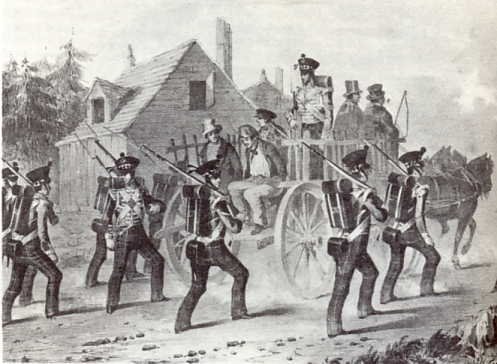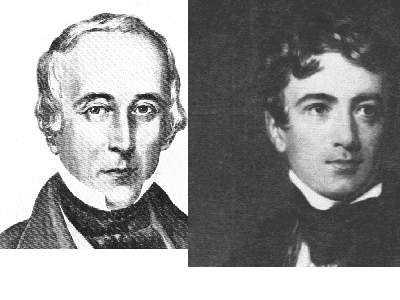
foreword | Historical Narratives | Resources | Links | Contact
THE SHORT HILLS AFFAIR, PART 2
History is revisionist.
Within days of the Short Hills' clash on June 21st, the militia had rounded up and jailed thirty-nine men and two women. The two women were not directly involved and were released. During this period of rancor, revenge and vindictiveness the loyal militia sought ruthless retribution through cruel suppression of known and suspected rebels.
 |
|
Rebel Roundup |
Presumed traitors were tossed into jail on the slightest whim where without habeas corpus they remained untried for months. The Short Hills' treason trials received priority attention because the government hoped a speedy show trial would nip in the bud any other patriot plans of conquest.
To call attention to the dire consequences resulting from these border incursions, Lieutenant-Governor Arthur declared that he expected the execution of "no less than four prisoners," one in ten of those arrested. The sentence was meant to strike terror into the hearts of "these mad dogs." Because those arrested were armed with swords, spears, muskets, bayonets, rifles, pistols and other offensive weapons to be used against the "peace of Her Majesty Victoria with intent to do her some grievous harm," they were indicted for high treason. Niagara's courthouse was the focus of fascinated attention when the trial opened promptly on Wednesday, July 18th, 1838.
The original Patriot leader, Colonel James Morreau, [See Below *] who had issued a proclamation headed, "State of Upper Canada, June 7, 1838," was a 32-year old Irish-American tanner from Pennsylvania. Described as a fine, commanding figure with gentlemanly manners, Morreau was also a man of dash and defiance. As he was being escorted through Queenston someone offered him a drink which he tossed off with the toast: "May Canada never become quiet until the American eagle floats on the Heights of Queenston."
On July 19th Morreau was tried, convicted of high treason and sentenced to be hanged. His punishment, which was sure and swift, was meant to "cool the courage of the scoundrels." In the absence of a regular Jack Ketch, the alias assigned to executioners, not even a hundred dollar bribe could induce anyone to take on the terrible task. Consequently, Sheriff Alexander Hamilton of the Niagara District became the reluctant executioner. Hamilton told Morreau that as an act of kindness he would arrange the gallows so that Morreau would plunge 18 feet before being snapped to his death. After being allowed a few days to arrange his worldly affairs Morreau was given "the long drop" on Saturday, July 30th.
Both the excuted and the executioner received accolades. A compatriot said Morreau, who was liked and mourned by many, died like a man, "a glorious martyr in the cause of truth and the rights of man." The government congratulated Hamilton on "the cool, firm and efficient manner" in which he had "hurried Morreau into eternity."
The Short Hills' trials ended on August 18th. Of the convicted rebels from the United States, 14 had their death sentences commuted by Lord Durham to transportation to Van Diemen's Land, an island off the southeast coast of Australia known today as Tasmania. Three others were sent to the penitentiary in Kingston, one for fourteen years and two for three years. Five were freed without trial, two were acquitted and one, Morreau, was hanged. Canadian rebels were dealt with less harshly than those from outside the country. One of them was transported, one imprisoned for three years, six were acquitted and seven were freed without trial.
. Benjamin Wait, who was born in Markham Township in 1813, received the death sentence. Wait and his family settled at Black Creek where he married Maria Smith in 1836. After teaching for a time in Willoughby Township, Wait became a clerk in Port Colborne. Priding himself on his "well known radical principles," he first joined the rebellion in the London District. Later he crossed from Grand Island into Canada at Niagara and served as major with the Short Hills' patriots. Captured on April 24th he refused to cooperate with his captors. His obstinacy convinced Lieutenant Governor Sir George Arthur that Wait because he was "bold and intelligent was a dangerous type. In August Wait was tried for treason and found guilty. The jury recommended mercy but when challenged by the judge to justify it they were unable to do so.
On August 11th Judge Jonas Jones decreed: "Benjamin Wait, you shall be taken from the court to the place from which you last came and there remain until the 25th day of August when between the hours of 11:00 a.m. and 1:00 p.m., you shall be drawn on a hurdle to the place of execution and there hanged by the neck until you are dead. May the Lord have mercy on your soul." This time the hangman, Jack Ketch, had been brought to Niagara from Toronto to carry out the "final performance" on Wait.
Among the crowd that crammed the stifling courthouse that sultry August afternoon was Wait's wife, Maria. She was a fearless, determined woman who fully supported her husband's rebel activities. As she heard the horrid sentence Maria vowed that it would not be carried out. She appealled unsuccessfully to Arthur. "I write with a breaking and disconsolate heart that Arthur although he granted them a respite of six days, would give us no hope that the lives of our dear ones will be spared. Oh, that we could be participators in the benign mercy so graciously extended to Lower Canadians by the humane and truly noble Earl of Durham."
Within hours of hearing Arthur's final word she decided to be a participator and set out on the long, difficult trip to Quebec City to see the one man who could save her husband - Lord Durham. Between August 11th and August 23rd she travelled 700 miles to and from Quebec to plead for her husband's life. She never did meet with Durham but was assured by his secretary that the sentence would be commuted. She was given a letter to take to to Sir George Arthur in which he was directed by Durham that that no further executions were to be carried out. The stay of execution arrived thirty minutes before Benjamin Wait was to be hanged. Arthur deeply resented Durham's interference but he abided by Durham's direction.
 |
|
Sir George Arthur & Lord Durham |
Early in 1839 Wait and eight other state prisoners were transported to Van Diemen's Land. In late 1841 or early 1842 Wait and and a man named Chandler escaped and after experiencing a number of harrowing adventures on an American whaler they reached the United States. In 1843 Benjamin and Maria wrote a book detailing his adventures. Shortly after its publication Maria died during the birth of twins. Benjamin lived for a time in Elmira, New York where he was employed in the barrel-making business. Although Benjamin never returned to Canada he delighted in the country's development towards democracy. He believed the patriots had speeded the process and resented the fact that little recognition was given to them. In 1895 he moved to Grand Rapids Michigan where he died at the age of 82.
The Patriot uprising failed through lack of leadership and organization but it was not a fruitless endeavor. It forcibly impressed upon the Imperial powers that serious problems existed in the Canadian colonies. The British government could no longer ignore the demands for change and recognized the necessity to remove the cause of discontent. The Canadian crises resulted ultimately in Durham's search for solutions. His Report initiated the spirit of reform which led eventually to colonial self-government in all of the British North American colonies.
[*] In 1838 a convention took place in Cleveland at which a republican government was formed for Upper Canada. Various officials were appointed and decisions were made about currency. One of the heads the proposed bills were to carry was that of Morreau along with the wordsLiberty, Equality, Fraternity.
Copyright © 2013 Website Administrator